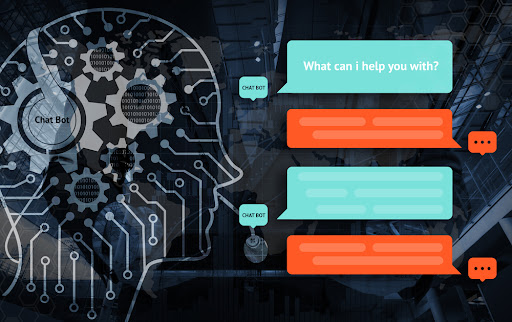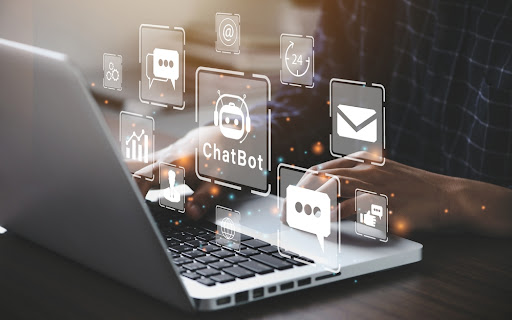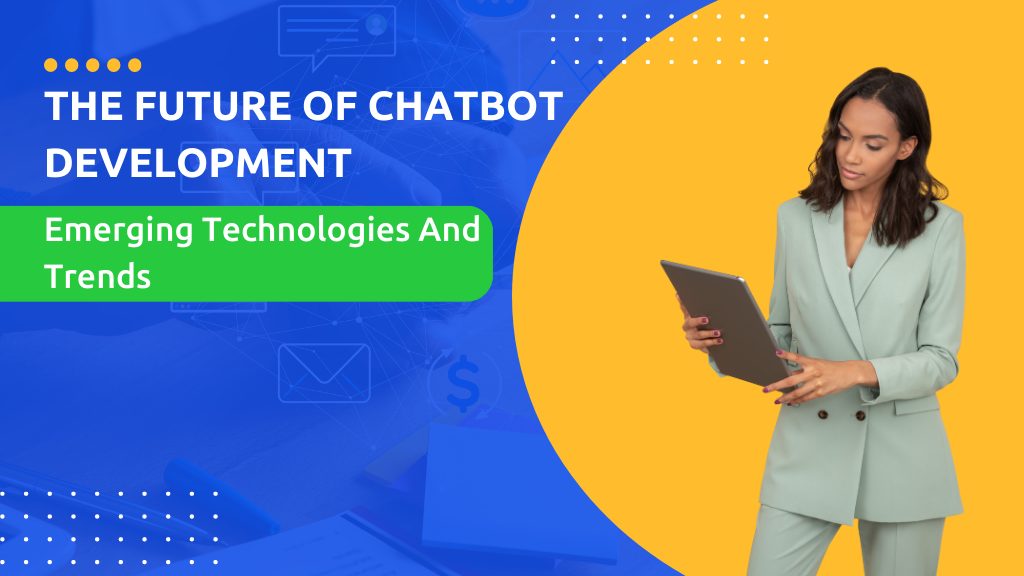
A chatbot is a computer program or an AI-driven application designed to simulate human-like conversations with users through text or speech-based interfaces. It utilizes natural language processing (NLP) and machine learning algorithms to understand and respond to user queries or commands in a conversational manner.
Artificial Intelligence (AI) is booming and keeps gaining pace. It confidently integrates into business processes and changes strategic business approaches. And so are chatbots being an integral part of AI technology.
Just like AI, chatbots are here to stay. By ensuring new communication opportunities, they transform the way businesses interact with their customers to let organizations bring their customer relationships to yet another level.
Chatbot usage is not at its peak yet. There is a huge potential for its quick future increase following the technology development. What’s waiting for this tech around the corner? How will it progress? What are the upcoming trends? How future of chatbot development is going to be? Let’s figure it out together.
By leveraging emerging technologies and choosing the right Node.js hosting solution for your Node.js chatbot development, you can create a robust and scalable conversational experience for your users.
Chatbot Benefits for Business

In recent years, chatbot popularity in a business environment has been steadily increasing, which is no wonder since they offer multiple advantages for businesses. Their importance lies in their ability to provide automated and efficient support, streamline business operations, and enhance user experiences. How exactly do they do that? Here are the major benefits businesses reap when using chatbots:
- Enhanced customer service: Chatbots can provide round-the-clock customer support, ensuring that customers receive assistance at any time, even outside regular business hours. Advanced assistants can even analyze customer data and past interactions to provide personalized recommendations and suggestions. Also, you can integrate chatbots with inventory management software to improve customer experience by providing real-time inventory information, assisting with inquiries, processing orders, and offering personalized recommendations.
- Cost savings: Automating customer interactions with intelligent bots can significantly reduce costs associated with certain business processes. Thus, conversation assistants allow companies to save 30% on customer support costs alone. Overall savings from chatbot usage in 2022 exceeded $11 billion.
- Improved customer engagement: Automated assistants can engage customers in interactive and dynamic conversations, creating a more engaging and personalized experience. Capable of providing relevant and meaningful responses, they help foster positive brand perception.
- Increased lead generation: By engaging with website visitors and capturing their contact information, talk bots can qualify leads based on specific criteria. Focused on pinpointing high-quality leads, they greatly contribute to conversion rate improvement.
Generate More Leads With Website & Messenger Chatbots
Gather quality leads on autopilot and 10x your ROI with automated chats
- Data collection and analysis: Chatbots can collect valuable data during interactions, including customer preferences, frequently asked questions, and pain points. This data can be further analyzed to identify behavior patterns, customer trends, and areas for improvement. By leveraging this information, businesses can optimize their products, services, and customer support processes, resulting in enhanced overall performance in chatbot marketing.
- Scalability: As ventures grow, managing customer inquiries might become overwhelming. AI assistants provide a scalable solution by handling a large number of simultaneous conversations without compromising response quality. They can easily process an increasing volume of inquiries without requiring additional resources.
Current Chatbot Technology Adoption

To better understand how chatbot technology will progress, it’s necessary to cast a quick look at where it is now. Virtual assistants are not new to business environments. Many companies and organizations across different industries have already adopted chatbots and made use of them on a regular basis.
E-Commerce
Online retail was among the first to adopt chatbots. They assist customers with product recommendations, order tracking, and the overall shopping experience. AI assistants can also handle customer queries related to pricing, returns, and shipping information, thus, improving customer satisfaction and reducing the workload on human support agents. In 2023, chatbot for Ecommerce sales is expected to reach $112 billion.
Financial Sector
The banking sector has embraced conversation assistants for tasks like balance inquiries, transaction history, fund transfers, and bill payments. Talkbots can also provide personalized financial advice and guide users through complex processes like loan applications. This way, banks can provide round-the-clock assistance and greatly enhance customer service. Thus, the global chatbot market in the BFSI sector is expected to hit the 6.83 billion mark in 2030.
Healthcare
In the healthcare industry, virtual assistants aid in patient engagement and support. They can schedule appointments, provide basic medical information, offer medication reminders, and assist with mental health support. AI assistants are also being explored for triaging patients and providing initial assessments before connecting them with appropriate healthcare professionals. According to the Market Research Future report, around 52% of patients get their medical data from talk bots, and over 36% approve of their use in treatment.
Travel and Hospitality
In the travel industry, chatbots are being utilized for tasks like flight and hotel bookings, itinerary suggestions, and travel recommendations. They can also assist travel agents with customer inquiries related to travel policies, baggage information, and visa requirements. AI assistants help streamline the booking process and provide personalized advice based on user preferences. Over 25% of travel and hospitality businesses worldwide already use talk bots for those purposes.
Human Resources
In the HR domain, AI assistants are revolutionizing HR services for small businesses. These tools assist with onboarding, employee self-service, and answering common HR-related questions. They can provide information about company policies, vacation accrual, benefits enrollment, and training programs. By optimizing and facilitating administrative processes, they free up HR personnel for more strategic initiatives. Thus, on average, bots free up to 12.000 hours annually for HR departments.
Chatbot Market Size and Growth Prospects

Global digitalization sets the rules and requirements for business operations and strategies forcing companies to catch up with technological advancements and emerging trends. An upsurge in chatbot usage was observed during the pandemic and post-pandemic periods when most businesses shifted online.
Under Tidio’s research, with over 1.5 billion people using AI assistants, the chatbot market size in 2023 is expected to hit $994 million. At a forecast annual growth rate of 22%, the market value will cross the $3 billion mark by 2030.
Quick chatbot market growth is driven by such factors as:
- Increased demand for continuous customer support and assistance;
- Technology adoption by multiple marketers;
- Growing technology integration with e-commerce and other industries using online order and support processes.
Noticeably, virtual assistants are more actively used by mid-sized and smaller businesses that prefer ready-made solutions accessible via chatbot agency. When it comes to bigger market players, they think strategically and more often, choose to develop their own solutions perfectly customized to their needs.
Besides, with text talk bots taking the lead now, in 2023, voice assistants will become more and more popular. Companies will have to invest in voice technology to win customer loyalty and gain a competitive advantage.
When it comes to revenue predictions, according to the Business Insider report, retail customers will spend over $142 billion using chatbots in 2024, with 75-90% of queries being processed by AI assistants.
Trends Shaping the Future of Chatbots

Modern customers are demanding, exacting, and picky. With customer relationships in focus, companies should offer unique and exclusive experiences to generate leads, convert them to customers, and retain their clients. Currently, chatbots are widely used by organizations for improving business-to-customer interactions and enhancing customer experiences.
Talk bot usage will continue to grow, and AI assistants will become more complex, sophisticated, responsive, and functional. Below are a few key trends that will shape the future of chatbots.
Higher Personalization and Better Contextual Understanding
The future of chatbot technology is strongly linked to personalization. Talk bots will be able to provide tailored experiences to individual users. By grasping user preferences, history, and behavior patterns, they will be able to deliver personalized recommendations, suggestions, and responses. User data analysis combined with advanced algorithms will allow conversational assistants to customize their interactions to cater to the unique needs of each user for maximum engagement.
On top of that, future AI assistants will be able to interpret user queries in the appropriate context, taking into account previous conversations, user intent, and relevant information. Context-aware chatbots will gain the capability to maintain coherent and continuous conversations, comprehend complex requests, and seamlessly transition between different topics, providing a more natural and intuitive user experience.
Moreover, with the assistance of e-learning software development services, chatbots can offer tailored learning experiences to individual users. Imagine an e-learning chatbot that analyzes your learning preferences, tracks your progress, and provides customized recommendations based on your strengths and weaknesses. These personalized learning suggestions and adaptive feedback can greatly enhance your e-learning journey, helping you acquire knowledge more effectively and efficiently.
More Human-Like Conversational Experiences
One of the key trends in chatbot development is the incorporation of emotional intelligence and empathy. Virtual assistants will be designed to understand and respond to users’ emotions, ensuring empathetic and supportive interactions. Deploying sentiment analysis, natural language processing, and machine learning techniques, chatbots will recognize and adapt to users’ emotional states to offer appropriate responses and assistance. As a result, the improved emotional connection will help users feel more understood and foster a sense of trust and engagement.
Talk bots will not only serve as functional assistants but also as virtual companions. They will be designed to engage in social conversations, provide companionship, and even help with mental well-being. Virtual companions will be able to understand users’ needs, offer companionship in times of loneliness, provide mental health support, and engage in casual or meaningful conversations. These AI assistants will leverage advanced natural language processing and emotional intelligence algorithms to create more human-like and fulfilling interactions.
Integration With IoT and Smart Tech
Integration with the Internet of Things (IoT) has the potential to revolutionize the capabilities of chatbots, transforming them into powerful tools to seamlessly interact with and control the physical world via natural language conversations. Utilizing smartphones as an interface, users can easily command these chatbots from anywhere to manage a wide array of IoT devices. They will be able to use talk bots to control smart appliances, manage security systems, access information about their environment, and perform various tasks seamlessly within their connected ecosystem.
IoT-powered virtual assistants can collect and analyze large volumes of data, enabling businesses to gain valuable insights. For instance, a chatbot in a manufacturing environment can monitor machine performance, identify patterns, and predict maintenance needs. This data-driven approach optimizes operations, reduces downtime, and enhances overall efficiency.
By combining the power of AI-driven conversational interfaces with real-time data and control over IoT devices, chatbots will become intelligent, context-aware, and highly helpful assistants that enhance user experiences, automate tasks, and provide useful observations for businesses.
Thus, if you’re looking to develop advanced chatbot solutions leveraging the capabilities of Node.js, it’s beneficial to hire Node.js developers who specialize in creating scalable and efficient applications.
Voice Bots Expansion
Voice-activated assistants, such as Amazon’s Alexa, Google Assistant, or Apple’s Siri, have already gained significant popularity. In the future, chatbots will further integrate with these voice-activated ecosystems to provide more comprehensive and versatile conversational experiences.
Voice-powered conversational bots will enable hands-free and convenient communication. This integration will also allow AI assistants to process the vast amount of information available through these ecosystems, enhancing their knowledge and capabilities to:
- Get customers hooked with automated intelligent communication;
- Provide correct real-time data;
- Minimize issues when handling user requests.
Integration With Social Media
As social media platforms continue to dominate online interactions and user engagement, incorporating chatbot functionality within these platforms offers numerous advantages and opportunities. With billions of users worldwide, social media are ideal channels for chatbots to reach a vast audience.
By integrating conversational bots into social media platforms such as Facebook Messenger, chatbot for WhatsApp, or Twitter, businesses and organizations can connect with users directly on the platforms they already use, increasing their reach and potential customer engagement.
With AI assistants on social media, companies will get new marketing opportunities. Chatbots can assist with lead generation, conduct surveys, provide product recommendations, and even facilitate transactions directly within platforms. By embracing this technology in their social media marketing strategies, organizations can automate various aspects of the customer journey, improve lead nurturing, and drive conversions.
Chatbot Challenges to Embrace the Future Development

Embodying a huge potential for further advancements, chatbots entail certain challenges as well. To let technology progress and become even more useful, functional, and efficient than it is now, those challenges need to be investigated and addressed.
- Handling ambiguity: Language is often ambiguous, and understanding ambiguous queries or statements is a challenge for chatbots. Building chatbots that can handle ambiguity effectively will require advancements in natural language understanding and reasoning.
- Avoiding bias and misinformation: AI assistants learn from the data they are trained on, which can lead to biases and propagate misinformation. Addressing biases in training data and designing mechanisms to detect and mitigate the spread of misinformation will be critical to ensure responsible and reliable chatbot interactions.
- Seamless Integration with other systems: Talk bots are often built into larger systems. Ensuring seamless integration with existing systems and technologies can be challenging, as chatbots need to work well with various platforms, databases, and APIs.
- Ethical considerations: As AI assistants become more sophisticated, ethical concerns will arise such as transparency, privacy, consent, and ensuring that chatbots do not manipulate or deceive users. Creating ethical guidelines and frameworks for conversational assistant development and usage will be important for diligent AI deployment.
Final Thought
As AI technology expands and evolves, chatbots will upgrade to a new level too. They’ll become more exquisite, intelligent, and human-like opening new use opportunities for consumers and businesses alike.
It’s no doubt, conversational AI assistants will be the mainstream for various business functions, allowing companies to further refine customer experiences from different angles. Obviously enough, to stay on top of their capabilities and survive in a highly competitive environment, organizations should apply strategic approaches and strive to implement chatbots in various areas.
Generate More Leads With Website & Messenger Chatbots
Gather quality leads on autopilot and 10x your ROI with automated chats


